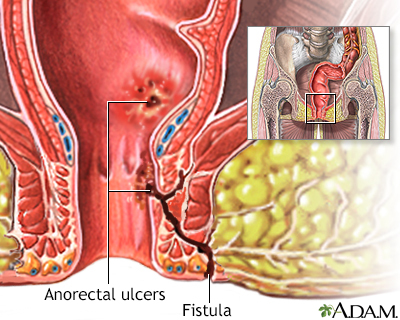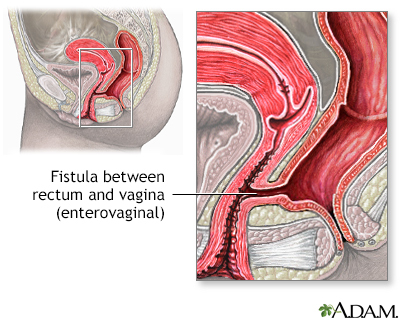Definition
A fistula is an abnormal connection between two body parts, such as an organ or blood vessel and another structure. Fistulas are usually the result of an injury or surgery. Infection or inflammation can also cause a fistula to form.
Information
Fistulas may occur in many parts of the body. They can form between:
- An artery and vein
- Bile ducts and the surface of the skin (from gallbladder surgery)
- The cervix and vagina
- The neck and throat
- The space inside the skull and nasal sinus
- The bowel and vagina
- The colon and surface of the body, causing feces to exit through an opening other than the anus
- The stomach and surface of the skin
- The uterus and peritoneal cavity (the space between the walls of the abdomen and internal organs)
- An artery and vein in the lungs (results in blood not picking up enough oxygen in the lungs)
- The navel and gut
Inflammatory bowel disease, such as ulcerative colitis or Crohn disease, can lead to fistulas between one loop of intestine and another. Injury can cause fistulas to form between arteries and veins.
Types of fistulas include:
- Blind (open on one end only, but connects to two structures)
- Complete (has openings both outside and inside the body)
- Horseshoe (connects the anus to the surface of the skin after going around the rectum)
- Incomplete (a tube from the skin that is closed on the inside and does not connect to any internal structure)
References
De Prisco G, Celinski S, Spak CW. Abdominal abscesses and gastrointestinal fistulas. In: Feldman M, Friedman LS, Brandt LJ, eds. Sleisenger & Fordtran's Gastrointestinal and Liver Disease. 11th ed. Philadelphia, PA: Elsevier; 2021:chap 29.
Lentz GM, Fialkow M. Anal incontinence: diagnosis and management. In: Gershenson DM, Lentz GM, Valea FA, Lobo RA, eds. Comprehensive Gynecology. 8th ed. Philadelphia, PA: Elsevier;2022:chap 22.
Taber's Cyclopedic Medical Dictionary. 24th ed. F.A. Davis Company; 2021 www.tabers.com/tabersonline. Accessed April 5, 2022.




